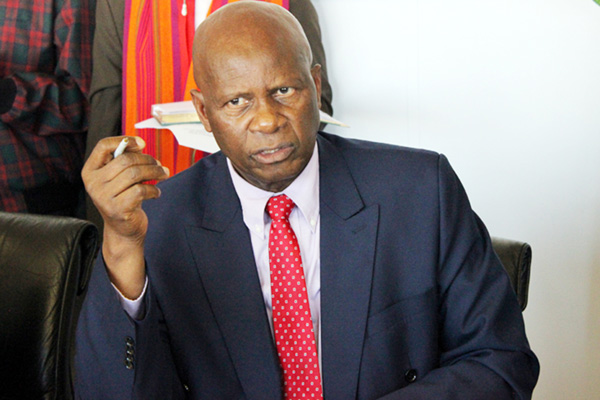
At least five institutions have since December made much lower projections of this year’s economic growth than the 4,5% announced by government.
BY TATIRA ZWINOIRA
In his 2018 National budget statement, Finance minister Patrick Chinamasa projected a gross domestic product (GDP) growth rate of 4,5%. The five institutions, including a local research firm, have projected a modest growth rate this year.
The World Bank projects the economy to grow by just about 1,8%, the International Monetary Fund (IMF) by 0,8% while the African Development Bank (AfDB) projected a 1% growth rate. BMI Research forecasts a growth of 1,5% with a local firm Inter-Horizon Securities (IH Securities) projecting a growth of 3,8%.
Chinamasa’s projected growth rate was premised on the expected gains in agriculture, renewed interest from investors, implementation of critical reforms, and the putting in place economic and investment recovery measures.
Agriculture was projected to grow by 10,7% this year but things are not likely to go that way given the prevailing uncertain weather patterns. Elections which are expected around midyear, the absence of critical ‘legislative’ reforms and a stagnant economy, really make robust economic growth not that easy.
According to the US Agency for International Development’s Famine Early Warning Systems Network (Fewsnet), a leading provider of early warning and analysis on food security, there has been erratic rainfall and dry conditions in critical agricultural provinces.
Fewsnet reports that this has resulted in severe moisture stress for most crops in parts of the southern and northern regions with some farmers completely writing-off the season.
- Chamisa under fire over US$120K donation
- Mavhunga puts DeMbare into Chibuku quarterfinals
- Pension funds bet on Cabora Bassa oilfields
- Councils defy govt fire tender directive
Keep Reading
“There has been little ground water recharge and surface water collection in most areas, resulting in poor water availability and access. The poor rainfall performance is also expected to affect the availability of seasonal green crops for consumption, as well as on-farm casual labour opportunities, rates, and other livelihood sources,” Fewsnet said.
“The high likelihood of below-average rains for the remainder of the season is likely to significantly reduce crop yields and harvests across most parts of the country.”
In his monetary policy statement released on Wednesday, central bank governor John Mangudya said the renewed confidence in the new administration needed to be supported by going back to basics to restore business confidence and to foster discipline within the national economy.
In his monetary policy statement, Mangudya sought to buttress the confidence trajectory by “putting in place measures that gradually liberalise the foreign currency market as a way of indicating that the country is open for business.”
The World Bank remained skeptical about Zimbabwe’s economic rebound prospects due to ongoing cash shortages and has said that these shortages were likely to depress Zimbabwe’s medium-term growth prospects.
The IMF said substantial growth would not happen without tackling the fiscal deficit and better targeting the expense of agricultural support programmes.
In a recent briefing, IMF deputy spokesperson William Murray said efforts should be complemented by structural reforms to strengthen the role of the private sector by improving the business climate and reducing policy uncertainty.
He said while the IMF remained optimistic on economic growth and saw potential, Zimbabwe still faced severe challenges in the form of liquidity and inflationary pressures.
To that effect, government has so far accrued a $1,2 billion overdraft with the central bank which is at least 50% above the prescribed level as stipulated by law which attests to liquidity challenges.
BMI Research said lack of liquidity in Zimbabwe would continue to undermine prospects for economic growth in 2018.
In its report, Zimbabwe Equity Strategy 2018 — A New Era, that was released last week, IH Securities said that elections were another factor impeding growth.
“Our base case view is that gross GDP will grow 3,8% in 2018. Whilst we anticipate a sustained growth in agriculture, a significant increase in mining output and an improvement in the manufacturing sector, we are concerned that the impending elections might slow down decisions both on the local front and with international investors,” IH Securities said.
“We expect the current account deficit to continue to improve as we see government working hard to close the plugs via investment attraction. Liquidity will remain generally difficult in the short to medium term, although tobacco sales season in March will probably ease the pressure to a limited extent.”
IH Securities said while early signals in Emmerson Mnangagwa’s presidency were positive for the economy, time would tell to what extent Zanu PF would evolve in terms of approach.
In its African Economic Outlook for 2018, AfDB said elections scheduled for before July were likely to generate uncertainties that would hinder economic growth and investment.
“According to the World Economic Forum’s 2017/18 Global Competitiveness Report, the most problematic factors for doing business include policy instability, inadequate foreign currency regulations, inefficient government bureaucracy, difficulties in access to finance, inadequate supply of infrastructure, restrictive labour regulations, and inefficient tax administration and regulations,” AfDB said.
AfDB said the economic performance in 2018 was likely to be affected by political changes.
The bank said structural challenges such as high informality, weak domestic demand, high public debt, weak investor confidence, and a challenging political environment remained.
“Progress was made in improving the business climate, but governance and accountability remain problematic,” AfDB said.











